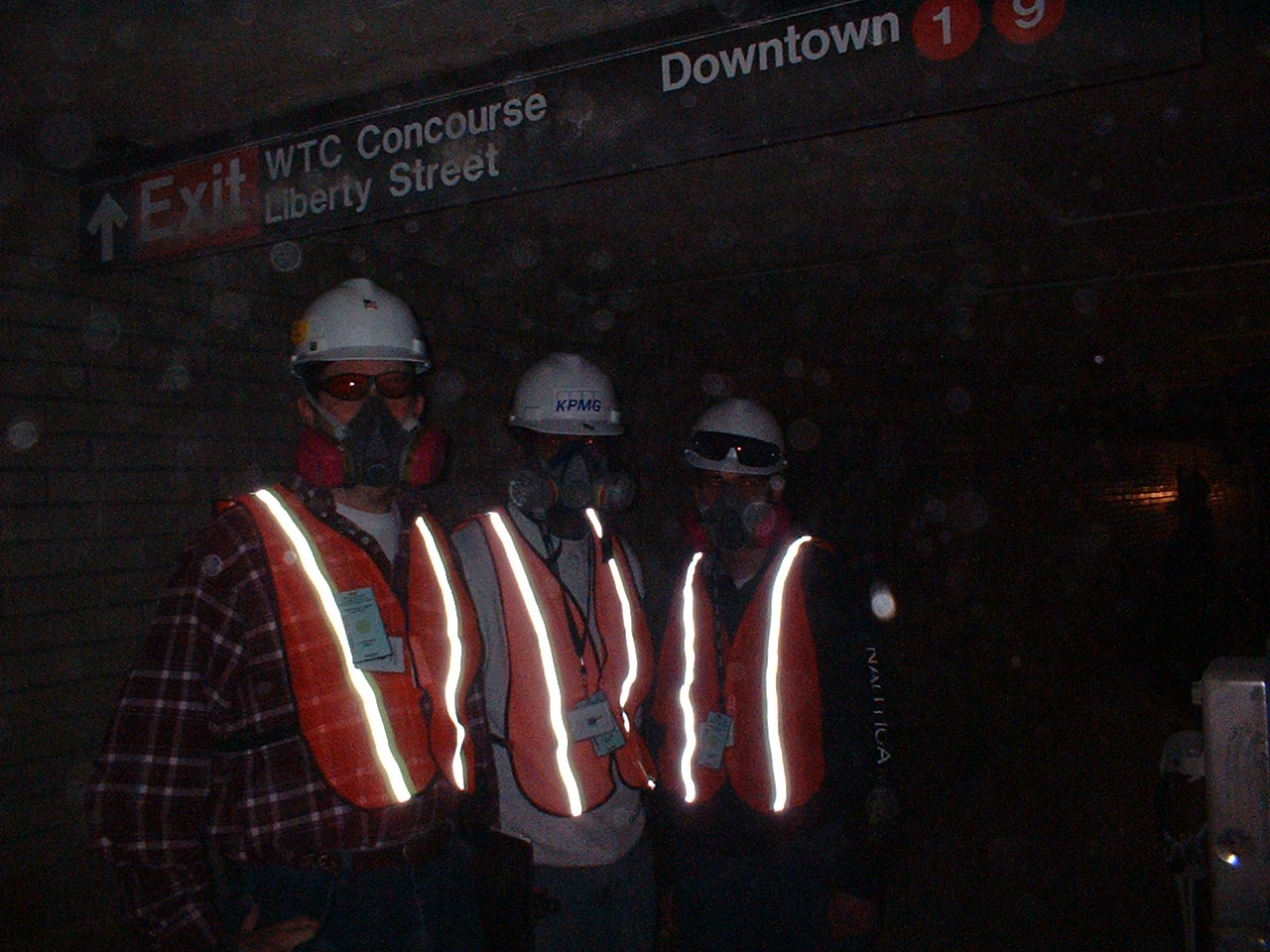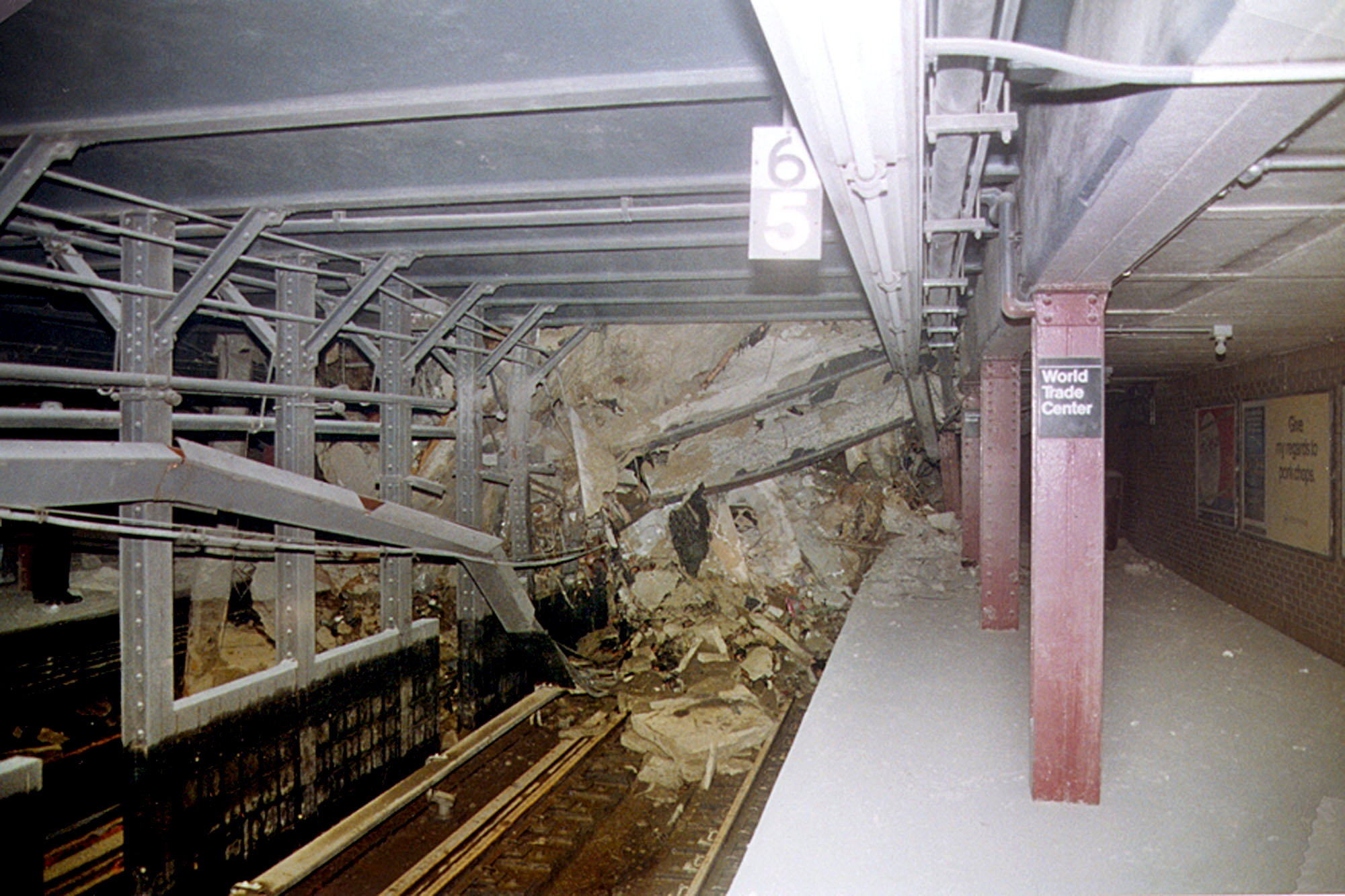Students starting Introductory Accounting I (ACCT 201) at the University of Nebraska–Lincoln come with preconceived notions about what accountants do. Steven Hegemann, '97 & '99, associate professor of practice in accountancy, challenges those stereotypes by sharing his experience as a U.S. Army veteran, auditor and forensic accounting consultant.
 Steven Hegemann (left) and two colleagues look to confirm a construction employee's location within the World Trade Center disaster recovery site.
Steven Hegemann (left) and two colleagues look to confirm a construction employee's location within the World Trade Center disaster recovery site.
"This class is the first time most students are around accounting. I leverage my experience — growing up in Fremont, Nebraska, being a non-traditional student after serving in the Army, completing my bachelor's and master's degrees at Nebraska and working as an auditor and forensic accounting consultant in New York City for over 15 years — to challenge students’ perceptions about what an accountant is and does," he said.
One of the first stories he shares is about serving as a worksite monitor for the World Trade Center Disaster Recovery project as part of KPMG's Forensics and Fraud Group. After the terrorist attacks of September 11, 2001, Hegemann spent a-year-and-a-half on the project for the Big Four accounting firm, including working every day for the first six months at the World Trade Center site.
"There is a billion-dollar contract for the recovery, and they want to make sure the money is going where it's supposed to go. Who are the best people to do that? It's accountants because it's their job to follow the money, yet most people only view accountants by what they see on TV," he said.
The unprecedented events on September 11 led to an aftermath of search and recovery, cleanup and, eventually, construction. The large undertaking meant many moving pieces, from equipment, people and contracts.
"A bunch of big construction companies came in and were tasked with cleaning up different sections of the World Trade Center site. After a few incidents, including someone stealing a load of scrap iron when they were still recovering human remains, the city hired construction monitors. I had done a lot of that type of work before, and even though I had just started on the auditing team at KPMG, I answered the call within the company to change positions to work on this project," he said.
Previously serving in Operations Desert Shield and Desert Storm as an Army section sergeant, Hegemann faced hard situations before. Just weeks after the terrorist attacks, the odds of finding someone alive were basically zero. The site was still full of ruins, potential hazards and charged emotions.
 Hegemann's view while searching for a construction employee shows how the north tower of the World Trade Center collapsed on itself and into the subway station below.
Hegemann's view while searching for a construction employee shows how the north tower of the World Trade Center collapsed on itself and into the subway station below.
"As soon as you crossed the street, everything changed. It was like the scene at the end of 'Saving Private Ryan' where they are walking through the city and everything is destroyed. It was almost like walking through a huge movie set, except you could smell it," he said. "Our team was there 24 hours a day because they worked around the clock. We were down there to check and make sure they were getting the stuff they needed, the equipment being paid for was on site and that contracted teams showed up to do the work."
In class, Hegemann shares two photos from his time on site. In the first, he and two colleagues are looking for a construction employee, and the second shows where they were looking for him.
"Workers had to check in before beginning their work, and we were looking for a man to ensure he was doing what he was supposed to be doing. In the beginning, we caught a bunch of people ghost employing (not being on-site while getting paid). This man we were searching for was working down in the train station below where the North Tower collapsed, and there was literally a big hole in the ground with a ladder in it. We climbed down to the platform underground, and the second photo shows our point of view," he said. "You can see why we wore respirators every day."
A native Nebraskan, Hegemann moved from Omaha to New York to start his new job at KPMG on September 10, 2001, in their midtown office. A last-minute change to send him and his wife, who also worked at KPMG, for training in Chicago saved them from being in the city on that fateful day.
"I was actually sitting in a conference room in Chicago, and we got nervous as all the cell phones started going off. They stopped the class and told us that a plane had hit one of the towers. With my wife being from New York, I didn't really think anything of it because I knew while it was unusual, it was not unheard of as a plane hit the Empire State Building a long time ago. The second plane crashing into the other tower changed everything. Our training ended, and we hung out in our hotel room until we figured out what was happening. We ended up taking a bus back to New York a day or so later because no planes were flying," he said.
While today's college students are too young to have memories of the September 11 attacks, Hegemann's experience expands their thoughts about what a potential career in accounting might entail. His story also exemplifies the zig-zag career path most take.
"It may not have seemed like it at the time, but it was an opportunity. I used my accounting background to transition into fraud, examinations and forensic stuff full-time. After the project ended, I transferred over to the KPMG forensics group. I provided forensic accounting and litigation support to companies involved in SEC investigation. Then I worked at an investment bank for a little while. Other things I have done have been because of my auditing and CPA experience," he said. "So I tell my students, if you don't know what you want to be when you grow up, being an accountant is a good choice because it allows you to see the company in totality. When you understand that, it's easy to transition to any kind of company."
Teaching their first accounting course, Hegemann solidified a future in accounting for Ale Guiza Gonzalez. A sophomore accounting major from Crete, Nebraska, Guiza Gonzalez said Hegemann made accounting sound "really interesting."
"He talked about the different career paths people can take in accounting. His class made me think about pursuing auditing, but I want to keep exploring before I decide," they said. "It's nice to hear someone's real-world experiences. It brings a level of humanity to such a wrongly stereotyped as boring job."
Published: September 11, 2023